Did Media Make Things Worse With Its Reports Of The Attack On Mollywood Actress?
A popular South Indian actress was abducted on Friday, but did the media do justice to the victim?
On the night of February 17, a popular Indian actress was allegedly abducted near Nedumbassery International Airport, when she was travelling from Thrissur to Ernakulam after a shoot. The Malayalam film fraternity and numerous politicians have come out in support of the actress and held a protest on Sunday evening at Durbar Hall ground in the Ernakulam district of Kerala. So far, three out of the seven accused have been arrested. Martin Anthony, the actor’s driver, was also arrested and produced before the magistrate on Sunday before being remanded to judicial custody. On Sunday, Pradeep and Saleem, natives of Kannur and Alapuzha, were picked up in Coimbatore, in Tamil Nadu after the police tracked them using their phones. While the police has issued a lookout notice to nab the prime accused, Sunil Kumar aka Pulsar Sunil, and the other three involved in the crime. Three out of these four have filed for an anticipatory bail claiming innocence.
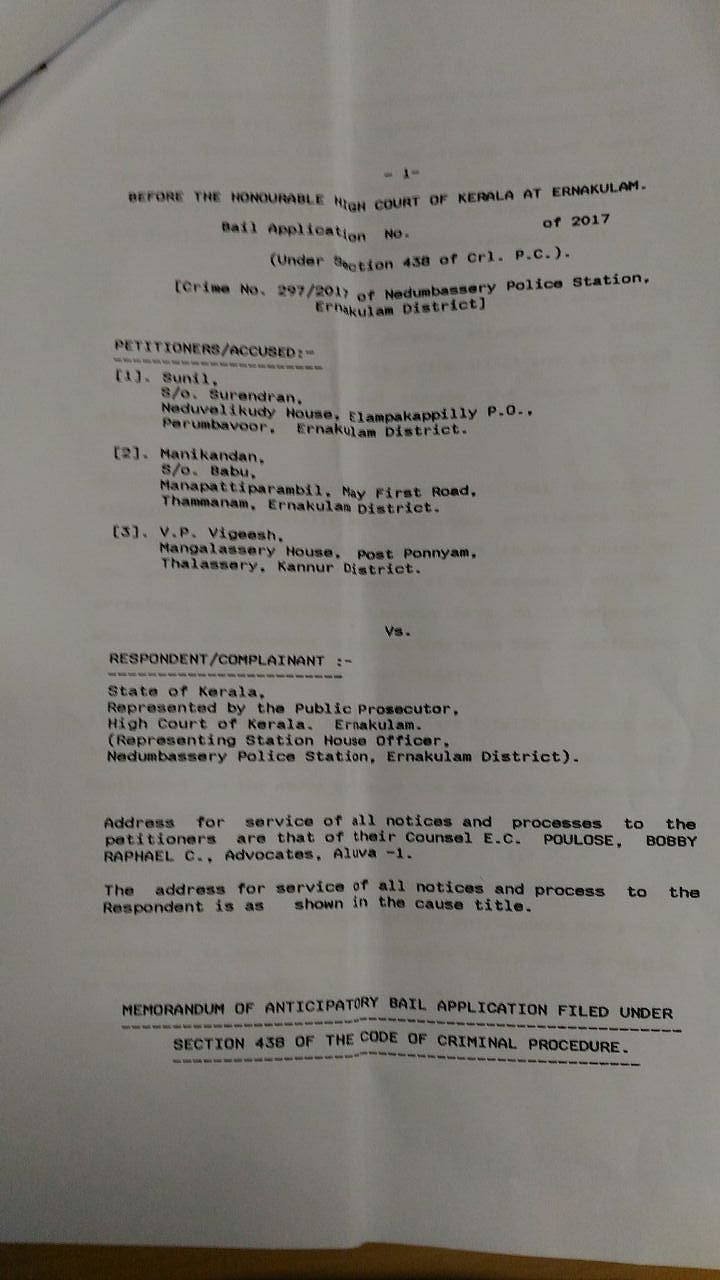
The South Indian Artist’s association (Nadiagar Samgam) appealed to the Chief Minister of Kerala, Pinarayi Vijayan, to take swift action against the culprits.
While the police’s swift response is laudable, how the India media has reported this incident leaves a lot to be desired.
To reveal or not to reveal?
You’d think that having to repeatedly write reports on rape would make our news agencies proficient at writing these incidents up. Yet The New Indian Express, Huffington Post, Hindustan Times, Deccan Chronicle, India Today and ABPLive were among those who revealed the identity of the survivor by naming her and posting pictures of her in their articles. The law is very clear that the identity of a victim is to remain undisclosed unless they specifically say otherwise. However, this basic rule of reporting crimes against women was not adhered to and even when her name was removed from the headline and the article, it remained in the hyperlink.





The channel in the eye of the storm is Kerala’s local news channel Kairali TV, which not only revealed the identity of the victim but also insinuated that there had been an intimate relationship between the actress and Sunil Kumar, who hasalso worked as her driver in the past.
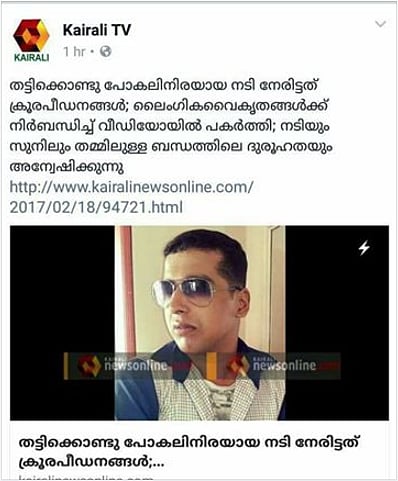
The channel has been lambasted by Kerala’s acting community for its insensitivity. Actor Rima Kallingal hit out at the channel and its Managing Director John Brittas on Facebook:
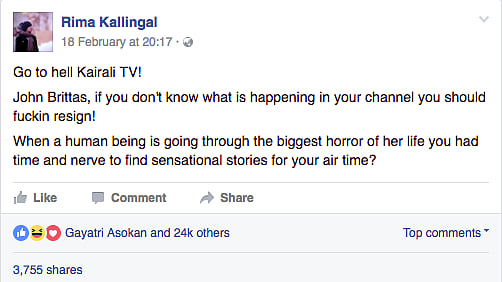
Actor Prithviraj Sukumaran took to Facebook to express his displeasure in how the media “reported, misreported and sensationalised” the incident.
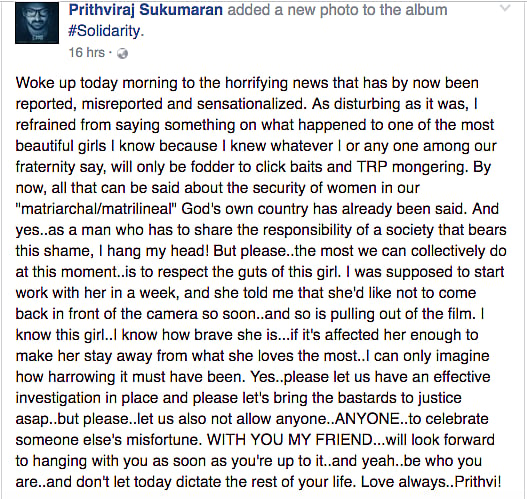
Kairali TV issued an apology yesterday and uploaded it on their website, saying it regretted the irreparable damage it had caused.
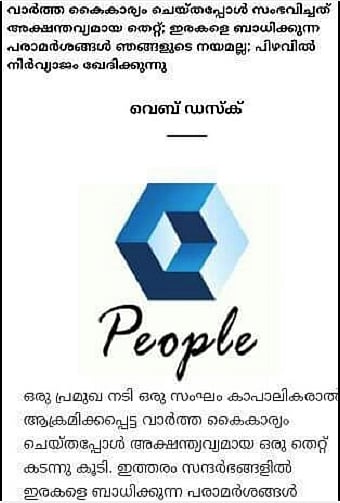
(Translation: “We committed an inexpiable mistake while reporting news. We don’t intend to divulge details that affect the victim. We express our unconditional apology.”)
As per section 228A of the Indian Penal Code, whoever prints or publishes the identity of “any person against whom an offence under section 376, section 376A, section 376B, section 376C, or section 376D,” can be punished with imprisonment, which may extend to two years and may also be liable to fine.
While many actors have made public declarations of support to the actress, some have also revealed the identity of the actor on Facebook and Twitter. These are not intended to offend – the name has usually popped up in posts that vow to support the actress. So far, there is no indication that the actress is comfortable with disclosing her identity. Kallingal, for instance, named the actress in a Facebook post that came after the one quoted earlier in this article, attacking the media for not respecting the actress’ privacy.
From trending hashtags on Twitter to URLs of articles, the actress’ identity is no secret. This is particularly complicated if she wasn’t ready for this disclosure because it’s another violation and it forces upon her a mantle of heroism which may not be what she opts for at this point.
Molestation or rape?
While The Hindu, Hindustan Times, Indian Express and Malayalam dailies like Malayala Manorama reported that the actor was “abducted and molested”, The Times of India and The NewsMinute reports suggest the actor was raped. The Sunday edition of TOI quotes an anonymous police officer who told the newspaper, “An FIR has been registered with sections of rape, criminal intimidation, criminal conspiracy and revenant sections of the IT Act.”
Responding to the suggestion that the victim had been raped (rather than molested), Kallingal lambasted the paper for its “third rate yellow journalism”. She wrote:
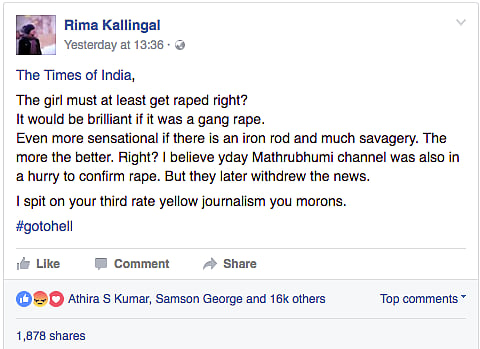
Newslaundry spoke to local journalists in Kerala who confirmed that the police has indeed charged the accused with Sections 376 (rape), 342 (wrongful confinement), 366 (kidnapping, abducting or inducing woman to compel marriage), 506 (criminal intimidation), 120 (b) (criminal conspiracy) and 34 of the Indian Penal Code; and Sections 66 (e) and 67 (a) of the Information Technology Act. While one reporter said “sections in the ‘rape’ clause are subjective” – referring to how the legal definition of rape was broadened in 2013 – there is no confusion among the journalistic community that this is a case of a violation that is more serious than molestation. The police has reportedly confirmed attempted rape, but the media has also been requested to only mention molestation. “The media isn’t using the term ‘rape’ because the victim’s identity is already out in the open. It is her honour at stake,” one reporter told Newslaundry.
It is entirely the victim’s prerogative to decide whether her identity should be disclosed and how she wants to pursue the case against her attackers. However, blurring the facts of the case – no matter how well-intentioned this move might be – is a decision that the Indian media would do well to introspect upon. Not only does it strengthen chauvinistic attitudes towards what constitutes a woman’s honour, but also unwittingly encourages sloppy reporting.
The central issue in the way this incident has been reported is that it’s robbed the actress of her agency to decide how her case is handled. Ironically, many have ended up forcing her into a position that she may not be ready to occupy while trying to make a statement of their support for her.
